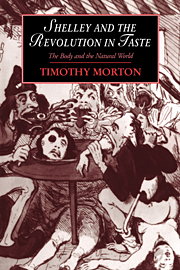Book contents
- Frontmatter
- Contents
- List of figures
- Acknowledgements
- List of abbreviations and a note on the text
- Introduction: prescriptions
- 1 The rights of brutes
- 2 The purer nutriment: diet and Shelley's biographies
- 3 In the face: the poetics of the natural diet
- 4 Apollo in the jungle: healthy morals and the body beautiful
- 5 Intemperate figures: re-fining culture
- 6 Sustaining natures: Shelley and ecocriticism
- Notes
- Bibliography
- Index
- Title in the series
1 - The rights of brutes
Published online by Cambridge University Press: 31 October 2009
- Frontmatter
- Contents
- List of figures
- Acknowledgements
- List of abbreviations and a note on the text
- Introduction: prescriptions
- 1 The rights of brutes
- 2 The purer nutriment: diet and Shelley's biographies
- 3 In the face: the poetics of the natural diet
- 4 Apollo in the jungle: healthy morals and the body beautiful
- 5 Intemperate figures: re-fining culture
- 6 Sustaining natures: Shelley and ecocriticism
- Notes
- Bibliography
- Index
- Title in the series
Summary
Look what a fine morning it is – Insects, Birds & Animals are all enjoying existence.
Mary Wollstonecraft, Original Stones from Real Life, frontispieceA SMALL SECT OF BRAHMINS
What does it mean, to eat? Eating is not only biologically necessary, but also culturally symbolic, and partakes in the social flow of commodities. The opinions of so-called ‘ecological’ anthropology, within which it was possible to assume that ‘cannibals’ ate meat because they needed the protein, have now been surpassed. The production, circulation and representation of food provide ways of understanding society.
Between 1790 and 1820 there was an interest in representing the consumption of food as an element of social structure. Godwin's Answer to Malthus (1820) compares the standard of living of the labouring poor in the sixteenth century and the contemporary period. By the act of Parliament 25 Henry vm limited the price of beef, veal, pork and mutton (named as the food of the poor). In the seventeenth century the high price of bread was not of vital import to the lower classes: they lived on other sorts of cheap food and occupied the land. But now, they could hardly afford meat, while tea and white bread had become necessities.
This chapter describes the intellectual, political and literary context in which it is possible to understand the Shelleys' writing about diet. The growth of urban culture and the imperial economy, and the language of rights that emerged in response to the French Revolution, all bear upon this issue. The first section shows to what extent groups of people practised particular forms of vegetarian diet in (roughly) the 1790–1820 period (encompassing Shelley's life).
- Type
- Chapter
- Information
- Shelley and the Revolution in TasteThe Body and the Natural World, pp. 13 - 56Publisher: Cambridge University PressPrint publication year: 1995



